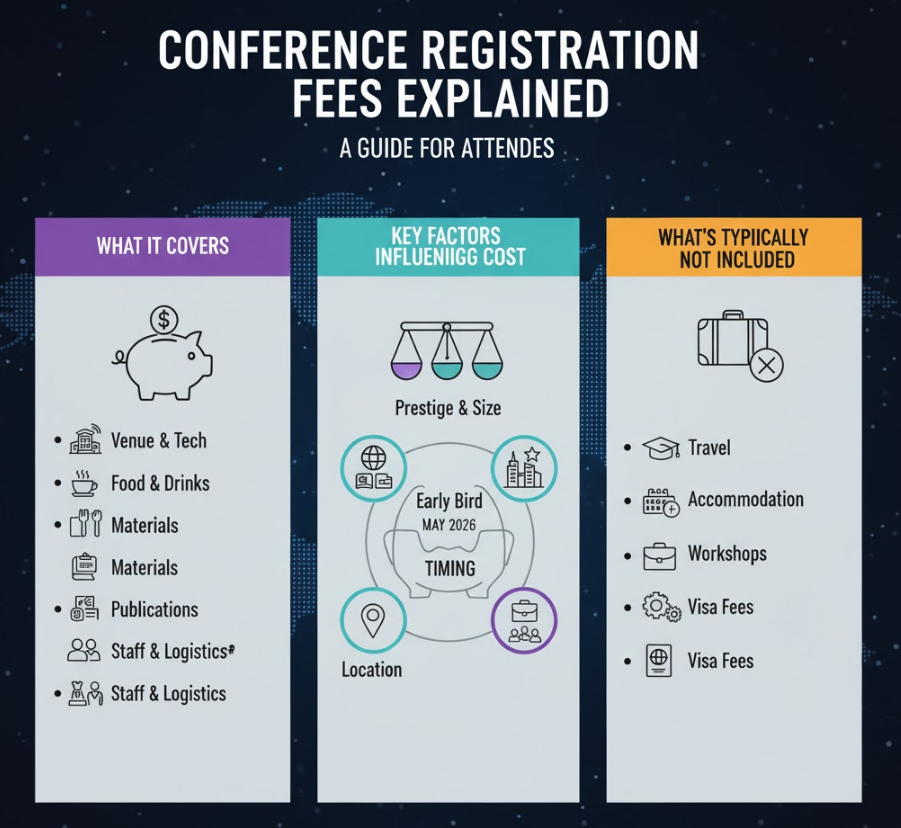When you decide to attend an academic or professional conference, one of the first and most significant costs you'll encounter is the conference registration fee. This fee is essentially the price of admission to the event. But what does it cover, why do conferences charge it, and what determines how much it costs?
This guide will explain everything you need to know about conference registration fees to help you budget and plan effectively.

A conference registration fee is the amount of money an attendee pays to the conference organizers to be officially registered for and gain access to the event. Paying this fee confirms your participation and typically grants you entry to sessions, materials, and specific social functions.
It's a standard practice across almost all academic, scientific, and industry conferences, whether they are held in-person, virtually, or in a hybrid format.
Organizing a conference is a complex and expensive undertaking. Registration fees are the primary source of revenue used to cover the numerous costs involved, which often include:
Venue Rental: Costs for conference centers, hotels, or university facilities.
Audiovisual (AV) Equipment: Projectors, microphones, screens, sound systems, and technical support staff.
Technology Platforms: For virtual or hybrid events, the cost of sophisticated online platforms for streaming, networking, and hosting content.
Food and Beverage: Coffee breaks, lunches, receptions, or gala dinners.
Staffing and Logistics: Event planners, administrative support, on-site staff, and security.
Speaker Expenses: Sometimes includes travel, accommodation, or honoraria for keynote or invited speakers.
Marketing and Promotion: Website development, advertising, and outreach.
Conference Materials: Printing programs, name badges, conference bags, signage.
Publication Costs: Fees associated with publishing the conference proceedings (e.g., in IEEE Xplore, Springer LNCS, ACM Digital Library).
Overhead Costs: General administrative and organizational expenses.
Without registration fees, most non-profit and academic conferences simply could not take place.
Conference fees can vary dramatically, ranging from under a hundred dollars to several thousand. Several key factors determine the price:
Conference Prestige and Size: Top-tier, large international conferences (like NeurIPS, CVPR, major medical congresses) generally have higher fees due to their scale, reputation, and extensive programs.
Location: Conferences held in expensive cities (e.g., San Francisco, London, Singapore - relevant to current location) naturally incur higher venue and catering costs, which are passed on to attendees.
Duration: Longer conferences (e.g., 5 days vs. 2 days) cost more to run and thus have higher fees.
Membership Status: Many conferences are organized by professional societies (like IEEE, ACM, APA). Members of the society often receive a significant discount on registration.
Attendee Category: There are usually different rates for:
Students: Heavily discounted rates.
Academics/Regular Attendees: Standard rates.
Industry/Corporate Attendees: Often the highest rates.
Attendees from Low/Middle-Income Countries (LMICs): Sometimes offered reduced fees.
Registration Timing:
Early Bird Registration: The lowest rate, offered for a limited time to encourage early commitment.
Standard/Regular Registration: The normal rate after the early bird deadline.
Late/On-site Registration: The highest rate, for registering close to or during the event.
Conference Format: Virtual conferences tend to be cheaper than in-person events as they save on venue and catering, but high-quality virtual platforms can still be costly. Hybrid events often have different rates for in-person and online participation.
While it varies, a standard in-person conference registration fee usually covers:
Access to all main conference sessions (keynotes, technical talks, poster sessions).
Access to the exhibition hall (if applicable).
Conference materials (program book, name badge, possibly a conference bag).
Coffee breaks.
Lunches (sometimes included, sometimes not).
Welcome reception or other social events (gala dinners may cost extra).
Digital access to the conference proceedings after the event.
Travel Costs: Flights, trains, local transportation.
Accommodation: Hotel or other lodging expenses.
Pre- or Post-Conference Workshops/Tutorials: These often require a separate registration fee.
Visa Application Fees.
Gala Dinner or Special Banquets: Sometimes these are ticketed separately.
Personal Expenses.
Register Early: Always aim for the "Early Bird" deadline for maximum savings.
Become a Member: If you plan to attend conferences by a specific society regularly, becoming a member can quickly pay for itself through registration discounts.
Look for Student Rates: If you are a student, ensure you register under the correct category.
Volunteer: Some conferences offer discounted or waived registration for student volunteers who help with tasks during the event.
Seek Funding: Explore travel grants from your university, department, advisor's research grant, or external funding bodies. Presenting a paper often strengthens funding applications.
Conference registration fees are a necessary component of organizing high-quality academic and professional events. They cover the essential costs of bringing the community together. By understanding what influences these fees and planning strategically—taking advantage of early bird rates and membership discounts—you can manage this significant investment in your professional development effectively.